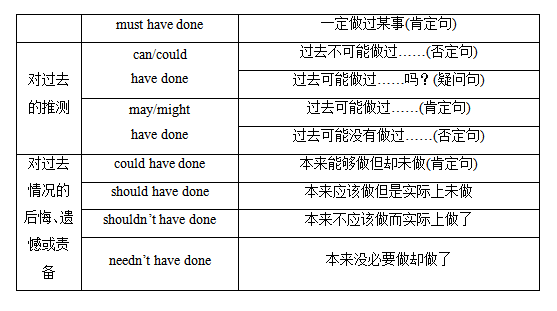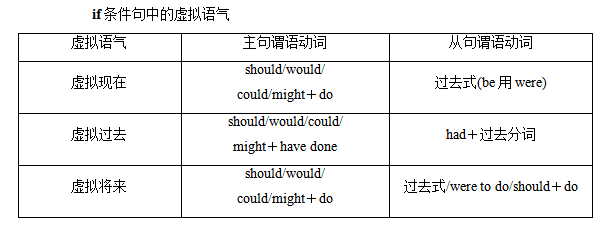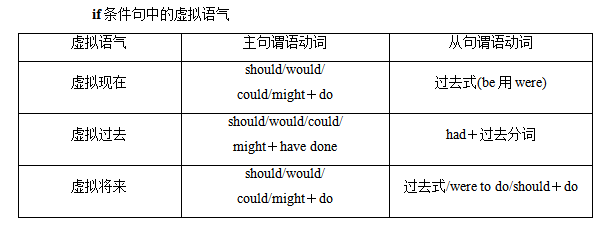|
语法可以说是不少同学的心头痛,小编将持续为大家整理高考英语语法易错点,及经典练习题,每一道题都有专业解析,语法薄弱的同学考前一定好好看!下面是情态动词常考题练习及解析,来练习吧!  【走进高考】 1.【2018·江苏】It's strange that he _______ have taken the books without the owner’s permission. A. would B. should C. could D. might 【答案】B 【解析】考查虚拟语气。句意:真奇怪,他竟然没有主人的允许就拿走了这些书。在句型 "It is important/ necessary/ strange/ impossible/ natural that…"中,其中由that引导的主语从句通常用“should+动词原形”,这样的虚拟语气,其中的should可以省略。故选B. 2.【2018·江苏】There is a good social life in the village, and I wish I _______ a second chance to become more involved. A. had B. will have C. would have had D. have had 【答案】A 【解析】考查虚拟语气。句意:在这个村里有很好的社交生活,并且我希望我再有机会去更多的参与。本题考查wish引导的宾语从句,表示与现在事实相反的愿望,所以从句用一般过去时。故选A。 3.【2018·天津】I can't find my purse. I ______it in the supermarket yesterday, but I'm not sure. A. should leave B. must have left C. might leave D. could have left 【答案】D 【解析】考查情态动词表推测和虚拟语气。句意:我不能找到我的钱包了,昨天我有可能把它落在超市了,但我不确定。根据句中时间状语yesterday可知,是对过去事情的推测,故用情态动词+have done,再根据后句but I'm not sure。可知,此推测为不能肯定的推测,故用情态动词could,表示“可能”,故选D 4.【2018·北京】In today’s information age, the loss of data _________ cause serious problems for a company. A. need B. should C. can D. must 【答案】C 【解析】考查情态动词。句意:在今天的信息时代,数据的丢失有时会对一个公司造成严重的问题。数据丢失造成严重问题是客观上会发生的情况,即“客观可能性”,故该空应用情态动词can。C选项正确。其余情态动词均没有该用法。need需要;should应该,竟然;must必须,肯定。 5.【2018·北京】They might have found a better hotel if they ______ a few more kilometers. A. drove B. would drive C. were to drive D. had driven 【答案】D 【解析】考查虚拟语气。句意:如果他们多开几公里的话,他们也许会找到一个更好的旅馆。由“they might have found a better hotel”可知,该句是表示对过去的虚拟。if ____ a few more kilometers是条件句部分,表示对过去的虚拟,条件句部分要用过去完成时态,故选D。 6.【2018·天津】If we ___ the flight yesterday, we would be enjoying our holiday on the beach A. had caught B. caught C. have caught D. would catch 【答案】A 【解析】考查虚拟语气。句意:如果我们昨天赶上飞机的话,现在我们正在海滩享受我们的假日了。根据时间状语yesterday可知,从句表示与过去事实相反,故用had + v-ed。故选A。 7.【2017·北京】Samuel, the tallest boy in our class, ______ easily reach the books on the top shelf. A. must B. should C. can D. need 【答案】C 【解析】考查情态动词。句意:Samuel,我班最高的男生,能很轻松地够着书架顶上的书。此处需要一个表示能力的词,故用can, 答案为C。 8.【2017·北京】If the new safety system _______ to use, the accident would never have happened. A. had been put B. were put C. should be put D. would be put 【答案】A 【解析】考查虚拟语气。句意:如果这个新的安装系统被投入使用的话,这个事故就不会发生了。根据主句确定是对过去情况的虚拟,所以从句谓语用had done形式,此外根据句意可知是被动,用被动语态,故选A。 9.【2017·江苏】_______ not for the support of the teachers, the student could not overcome her difficulty. A. It were B. Were it C. It was D. Was it 【答案】B 【解析】考查虚拟语气和倒装。虚拟语气中,be动词统一用were;虚拟语气的省略形式主要是把if省略,同时把were/should/had提前,即Were/Should/Had I,故选B。句意:要不是老师们的支持,该生是无法克服她自己的困难的。 10.【2017·天津】My room is a mess, but I _____ clean it before I go out tonight. I can do it in the morning. A. daren’t B. shouldn’t C. needn’t D. mustn’t 【答案】C 【解析】考查情态动词。 句意:我的房间很乱,但是在今晚我出去之前不需要打扫,我可以明天早晨再打扫。A.不敢;B.不应该;C不需要;D.不许。根据句意,故选C。 【语法精讲】 考点一 情态动词的基本用法 一、can和could的用法 1.表示“能力”,意为“能,会”。 (2017·北京卷)Samuel, the tallest boy in our class, can easily reach the books on the top shelf. Samuel是我们班最高的男孩,他能轻易地够着书架顶层的书。 (湖北卷)It was several minutes before I could take in what he was saying. 过了好几分钟,我才理解他说的是什么。 was/were able to表示过去有能力做并成功做了某事,相当于:managed to do sth./succeeded in doing sth.。 2.表示推测,意为“可能”,用于否定句或疑问句中。can比could语气强。 That can’t be Mary—she is in London now. 那不可能是玛丽——现在她在伦敦。 3.表示理论上的可能性,意为“有时候可能会”,用于肯定句。 (2018·北京卷)In today’s information age, the loss of data can cause serious problems for a company. 在今天的信息时代,数据的丢失有时会对一个公司造成严重的问题。 4.表示礼貌地请求,意为“能,可以”。在疑问句中could可代替can, 语气更委婉。 (2016·江苏卷)—Can you tell us your recipe for happiness and a long life? ——你能告诉我们你的幸福和长寿的秘诀吗? —Living every day to the full, definitely. ——当然是过好每一天。 5.用于固定句式中:can’t...too/enough “无论……也不过分”;“越……越好……”。 (陕西卷)I can’t thank you too much for all your help to my son while we were away from home. 我非常感谢你在我们不在家时对我儿子的帮助。 二、may和might的用法 1.表示许可和请求,在疑问句中might比may的语气更委婉。 Might/May I have a word with you? It won’t take long. 我可以和你说句话吗?不会耽误你很长时间。 2.表示推测,意为“可能,或许”,通常用于肯定句和否定句中。 (湖南卷)If you forgot to turn it off when you went away, you might burn down the house. 当你离开时如果忘记关掉它,你可能把整个房子都烧毁了。 3.用于固定句式:may as well+动词原形 “最好;倒不如……” Since it is raining hard, you may as well stay here. 既然雨下得这么大,你倒不如待在这儿。 三、must的用法 1.表示义务、必要性等,意为“必须”。其否定式mustn’t 意为“禁止”。 (湖北卷)We must act as quickly as possible now. Just tell us whether you can undertake the task or not. 现在我们必须尽快采取行动。你就告诉我们你能否承担这项任务。 2.表示猜测、推测,意为“想必,一定”。must常用于肯定句中,表示猜测。对现在或未来的事进行猜测时,用must do;对正在进行的事进行猜测,用must be doing;对已经发生的事进行猜测时,用must have done。 (重庆卷)You must be Carol. You haven’t changed a bit after all these years. 你一定是卡罗尔。这么多年你一点都没变。 3.表示偏执,固执,意为“非得,偏要”。 (辽宁卷)If you must go, at least wait until the storm is over. 如果你非要走,至少要等到暴风雨停了。 四、shall的用法 1.用于第一、第三人称疑问句中,表示说话人征求对方的意见或向对方请示。 (江西卷)Shall I tell Brett to come over straight after school tomorrow? 要我告诉布雷特明天放学后直接过来吗? 2.用于第二、第三人称陈述句中,表示说话人给对方的命令、警告、允诺或威胁。 (辽宁卷)One of our rules is that every student shall wear school uniform while at school. 我们有一条规定,那就是每名学生在校期间都必须穿校服。 五、should 的用法 1.表示劝告和建议,意为“应该”。 I don’t think you should give up the opportunity to go to university which you have been dreaming about. 我认为你不应该放弃你一直以来梦想的上大学的机会。 2.表示推测、可能性、或预期,意为“应该;可能”。 He should be here on time—he started early enough. 他应该按时到这里的——他很早就出发了。 3.用于表示感情或意志等的that从句中,意为“竟然……;居然……”。 (江苏卷)It was sad to me that they, so poor themselves, should bring me food. 让我难过的是,如此贫穷的他们竟然给我带来了食物。 六、will和would的用法 1.表示意志或意愿。will指现在,would指过去。 I have told him again and again to stop smoking, but he will not listen. 我已再三告诉他戒烟,但是他就是不听。 (江苏卷)Days later, my brother called to say he was all right, but wouldn’t say where he was. 几天后,我哥哥打电话说他一切都好,但不愿意说他在哪儿。 2.表示习惯性动作,意为“总是”,will指现在,would指过去。 (四川卷)I still remember my happy childhood when my mother would take me to Disneyland at weekends. 我仍旧记得快乐的童年,那时我妈妈经常在周末带我去迪士尼乐园。 3.表示征求意见或提出请求,多用于第二人称疑问句中。would比will语气委婉。 Will/Would you please let me have a look at your new watch? 请让我看看你的新表好吗? 七、need的用法 need表示必要性,常用于疑问句和否定句中,needn’t表示“不必”。need 作实义动词时,可用于肯定句、否定句和疑问句中,有人称、数和时态的变化;其后可接名词、代词、带to的不定式或动名词作宾语。(2017·天津卷)My room is a mess, but I needn’t clean it before I go out tonight. I can do it in the morning. 我的房间里乱糟糟的,不过我今天晚上出门之前没必要打扫,我可以上午再打扫。 Since you know it already, we don’t need to keep it a secret. 既然你已经知道了,我们就没有必要保密了。 八、dare的用法 dare意为“敢,敢于”,没有人称、数和时态的变化,主要用于疑问句、否定句和条件句中,后接动词原形。作实义动词时,在肯定句中通常接带to的不定式,在疑问句和否定句中,dare之后的不定式可省略。 How dare you leave your home without your parents’ permission? 在没有征得你父母的同意的情况下你怎么敢离开家? Most people hate Harry but they don’t dare to say so. 大多数人对哈利敢怒不敢言。 [对点演练]——单句语法填空 1.(2018·江苏卷)It’s strange that he should have taken the books without the owner’s permission. 2.(2016·天津卷)It was really annoying; I couldn’t(not) get access to the data bank you had recommended. 考点二  (2018·北京卷)They might have found a better hotel if they had driven a few more kilometers. 如果他们多开几公里的话,他们也许会找到一个更好的旅馆。 (北京卷)We would be back in the hotel now if you didn’t lose the map. 如果你没有把地图丢了的话,我们现在就回到旅馆了。 (安徽卷)Grace doesn’t want to move to New York because she thinks if she were to live there, she wouldn’t be able to see her parents very often. 格蕾丝不想搬到纽约,因为她认为如果住在那里,她就不能经常看到她的父母了。 如果在表示虚拟语气的if条件句中含有were, had或should, 可将if省略,然后将were, had或should移至主语之前。 (2017·江苏卷)Were it not for the support of the teachers, the student could not overcome her difficulty. 如果没有老师的帮助,这个学生克服不了她的困难。 如果主句和从句是对不同时间的事实的虚拟,则被称为错综虚拟语气。此时主句常有明显的时间状语。 (北京卷)Maybe if I had studied science, and not literature then, I would be able to give you more help. 也许如果当时我学的是理科而不是文科,那么我现在就可以给你更多的帮助了。 [对点演练]——单句语法填空 1.(2018·天津卷)If we had caught(catch) the flight yesterday, we would be enjoying our holiday on the beach now. 2.(湖南卷)Sorry, I am too busy now. If I had(have) time, I would certainly go for an outing with you. 3.—It’s a shame that you missed the lecture on the British culture given by Thompson. —I would/should have attended(attend) it, but I was busy preparing for the coming exam. 考点四 含蓄条件句中的虚拟语气 有时假设的条件不通过条件状语从句表达出来,而是隐含在某些词或短语中,或隐含在上下文中,这叫含蓄虚拟语气。常用的这类词或短语有:without(要是)没有;but for要不是;otherwise/or否则等。 (2017·天津卷) —Do you have Betty’s phone number? ——你有贝蒂的电话号码吗? —Yes. Otherwise, I wouldn’t have been able to reach her yesterday. ——是的,不然我昨天就不可能联系上她了。 (江苏卷)Many of the things we now benefit from would not be around but for Thomas Edison. 要不是托马斯·爱迪生,我们现在从中获益的很多东西就不会存在。 [对点演练]——单句语法填空 1.(安徽卷)It is lucky we booked a room, or we would have(have) nowhere to stay now. 2.(江西卷)We would have put(put) John’s name on the race list yesterday but for his recent injury. 考点五 虚拟语气在从句中的运用 一、在名词性从句中的运用 1.在表示要求、命令、建议、请求等动词后接的宾语从句中,以及这些动词的名词后接的同位语或表语从句中,谓语动词用“(should+)动词原形”。常见的此类动词:一坚持(insist)、二命令(order, command)、三要求(require, demand, request)、四建议(suggest, advise, propose, recommend)。 (江苏卷)She suggested that Dale join the debating team, believing that practice in speaking could give him the confidence and recognition that he needed. 她建议戴尔参加辩论队,她认为辩论队里的演讲练习会给予他所需要的信心和认可。 My suggestion was that necessary measures (should) be taken to protect the children from dangerous situations. 我的建议是采取必要措施来保护孩子们远离危险的境遇。 当suggest作“暗示,表明”,insist作“坚持认为”讲时,从句要用陈述语气。 His silence suggested that he agreed with my decision. 他的沉默表明他同意我的决定。 He insisted that he hadn’t stolen the money. 他坚持说他没有偷过钱。 2.在“It is/was+adj./done+that...”句型中,从句中的谓语动词用“(should+)动词原形”。常见的形容词或过去分词有important,necessary,strange,suggested,ordered,advised,requested,demanded 等。 It is necessary that we (should) clean the room every day. 我们每天打扫房间是有必要的。 It is required that middle school students (should) take at least one hour exercise every day. 中学生被要求每天至少进行一个小时的锻炼。 3.wish后宾语从句中的虚拟语气:  (陕西卷)Ellen is a fantastic dancer. I wish I danced as well as her. 埃伦是一个极出色的舞者。我希望我能够跳得和她一样好。 I feel so sick. I wish my mother hadn’t forced me to eat so much. 我想呕吐。我真希望我妈妈没强迫我吃这么多。 4.would rather所接的宾语从句中,从句谓语动词用一般过去时,表示对现在或将来的虚拟;从句谓语动词用过去完成时,表示对过去的虚拟。 (陕西卷)We would rather our daughter stayed at home with us, but it is her choice, and she is not a child any longer. 我们宁愿女儿待在家,陪在我们身边,但是选择权在她手里,毕竟她不再是个孩子了。 I’d rather he had gone to the seaside with me the day before yesterday. 要是他前天和我一起去海边就好了。 二、三个固定句式中的虚拟语气  (重庆卷)It was John who broke the window. Why are you talking to me as if I had done it? 打破窗户的是约翰。为什么你说得好像是我打破的似的? It is high time that we took/should take some measures to solve the problem. 确实到了我们应该采取措施解决这个问题的时候了。 Look at the trouble we are in. If only we had taken our teacher’s advice! 看看我们所处的困境,要是我们当初听从老师的建议该多好!= 当as if/though引导的句子所叙述的是真实的或极有可能发生或存在的事实时,从句要用陈述语气。 [对点演练]——单句语法填空 1.The Antarctica is so mystically described by some people. If only I had been(be) there before. 2.It is high time that we should devote/devoted(devote) ourselves to environmental protection and ecological improvement. 3.(2019·山西太原外国语月考)Though his face suggested that there was(be) nothing serious, the doctor still suggested he (should) stay(stay) in bed for a few days. 解题指导 如何判定情态动词和虚拟语气 1.意义和语气判断法 所谓意义判断法就是分析语境并确定应填情态动词的含义。因此熟练掌握每个情态动词的意义和用法是答题的前提。此外,情态动词主要表示说话人的语气、态度或情感,所以在解答此类试题时,要从说话者的角度去考虑问题,结合具体的语境来分析和判断,最后确定所需情态动词是否符合说话者的语气以及特定的情感需要。 [例1] (2016·浙江卷6月)George (not go) too far. His coffee is still warm. [分析] can’t/couldn’t have gone 由下文的His coffee is still warm可以看出,乔治应该是刚离开,不可能走太远,表示对过去发生的事情非常有把握的否定推测,应填can’t/couldn’t have gone。 2.时间判断法 虚拟语气的考查重点在于判断句子是对现在、过去还是将来的动作进行虚拟。判断出时间后再根据相应的结构或句型确定谓语动词的形式。 [例2] (天津卷)I wish I (be) at my sister’s wedding last Tuesday, but I was on a business trip in New York then. [分析] had been 句意:我真希望上周二参加了妹妹的婚礼,不过我当时正在纽约出差。根据句中的but可知“我参加了妹妹的婚礼”只是一种假设,根据空后的时间状语last Tuesday可知,动作发生在过去,此处表示与过去事实相反的假设,故谓语用“had+过去分词”结构。故答案为had been。 1.(2019·重庆第一次质量抽测)If the new safety system (bring) into use, the accident would never have happened. had been brought 解析:句意:如果新的安全系统已经投入使用,事故就不会发生了。根据句意、句子结构以及主句中的would never have happened可知,句中If引导的是虚拟条件句,且表示与过去的事实相反的假设,故从句时态应用过去完成时。 2.(2019·浙江杭州地区七校模拟)When you phoned me, I was having a meeting; how I wish I (answer) your call. had answered 解析:句意:当你给我打电话的时候,我正在开会。我多么希望我(之前)接了你的电话。wish后的从句中用虚拟语气,根据句意可知是对过去情况的虚拟,所以谓语动词用had done形式。 3.(2019·安徽江淮十校联考)As the deadline is drawing near, no one leave with his own work uncompleted. shall 解析:句意:因为截止日期即将到来,不完成工作,任何人不许离开。shall用于第三人称陈述句中,表示命令、警告,符合句意。 4.(2019·东北三校联考)The order came that the medical supplies (send) to the earthquake stricken area soon. (should) be sent 解析:表示建议、要求、命令等名词,如:suggestion, order, request, advice等后接的表语从句、同位语从句中谓语动词用(should+)动词原形。 5.(2019·湖北四地七校联考)It is high time that you (consider) that if there were no stress in your life, you would achieve a little. considered/should consider 解析:在It is high time that...句式中,从句用虚拟语气,即:谓语动词用过去式或should+动词原形。 6.(2019·天津七校4月联考)I was ill that day, otherwise I (take) part in the sports meet. would have taken 解析:句意:那天我病了,否则我就参加运动会了。根据语境可推知,设空处为与过去事实相反的虚拟语气,故答案为would have taken。 7.(2019·湖南长沙四校模拟)—I (not) thank you enough for what you have done for me. —You’re welcome. can’t 解析:句意:——你为我做的一切我无论怎么感谢都不为过。——不用谢。can not...enough表示“再……也不为过”。 8.(2019·广东惠州二调)Harry is feeling uncomfortable. He have drunk too much at the party last night. must 解析:句意:Harry觉得不舒服,他昨晚在聚会上肯定喝太多了。由last night及语境可知,此处表示对过去的肯定情况把握较大的推测。must have done sth.“一定做了某事”。 9.(2019·江苏苏州调研)John wants to see me now, but I have so much work on hand that I would rather he (come) tomorrow than today. came 解析:句意:约翰现在想看我,但是我手头有很多工作要做,我宁愿他明天来而不是今天。would rather后面接从句,用虚拟语气,和现在或将来相反用一般过去式,和过去相反用过去完成时,故填came。 10.(2019·包头模拟)As Father and Mother thought it was a big occasion for me, they suggested I (hold) a birthday party at home to celebrate it. (should) hold 解析:suggest表示“建议”时后面宾语从句的谓语动词应用(should+)动词原形,故填(should) hold。 本文内容综合来源网络,编辑,如有侵权,请及时联系删除。 (责任编辑:admin) |
